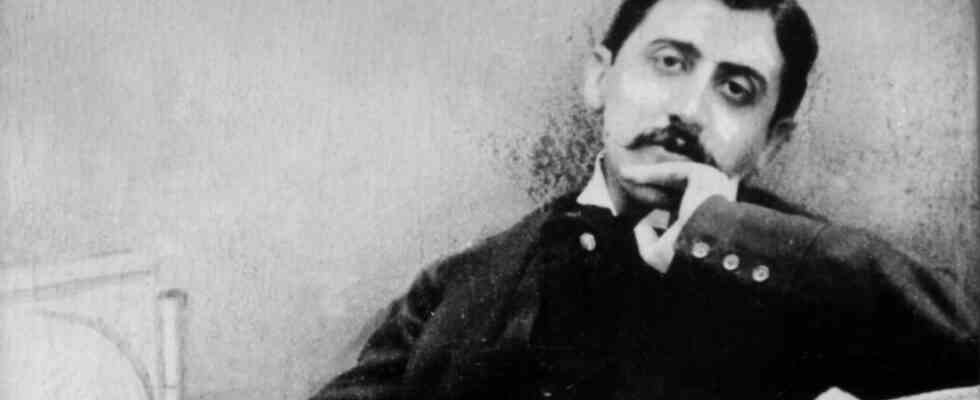When Marcel Proust died on Saturday, November 18, 1922, in his apartment on Rue Hamelin, the news of his death quickly spread among his friends and acquaintances. The painters Paul Helleu and André Dunoyer de Segonzac made portrait drawings on the deathbed, Man Ray came to Rue Hamelin with his camera. Of the Figaro published a lengthy report on the first page of the Sunday edition. Jacques Rivière, editor at Gallimard and editor-in-chief of the magazine Nouvelle Revue Francaise, brought out a special issue “Hommage à Marcel Proust. 1871-1922” at the beginning of 1923. Among the contributors were Maurice Barrès, Joseph Conrad, Ernst Robert Curtius, Philippe Soupault, Paul Valéry and many others. The first German translation of the texts by Jean Cocteau, Valery Larbaud and Paul Morand from this special issue has now been published in the “Schreibheft. Zeitschrift für Literatur”.
Larbaud looks back on the time when Proust was above all the translator of John Ruskin in the literary circles of Paris, and draws the link to the author of the “Research”, who by his death refuted everyone who adhered to the commonplace that this epoch was ” not a great epoch of literature”. Paul Morand, who liked to produce precious punch lines, wrote: “What struck me most when I met Proust was to meet someone who had died so young.” Jean Cocteau defended Proust’s frivolity and interest in fashionable life, not least on his own behalf. In his portrait of Proust’s voice, however, he captures one dimension of the work: “It’s difficult for me to appreciate his work read instead of it Listen.” Cocteau’s Proust can laugh: “Marcel Proust loved to laugh. He swam in it like in a developer bath.” Jürgen Ritte not only translated the texts, but also provided biographical sketches of the authors and an afterthought. She considers the idea in the passages about the death of the (fictitious) author Bergotte in his great novel wrote Proust himself the most beautiful obituary.
exercise book. Journal of Literature. No. 99. Rigodon, Essen 2022. 180 pages, 15 euros.
(Photo: Schreibheft/SZ)
“Bergotte’s Widow” is the name of the Proust homage by the Serbian writer Bora Ćosić, which places the notebook alongside the reminiscences of his contemporaries. Ćosić, now ninety years old, read Proust’s research when he was young. He realized the idea for “Bergotte’s Widow” sketched in 1994 in 2021. Proust wrote pastiches on Balzac, Flaubert and other authors, virtuoso pieces of irony-soaked stylistic mimicry. Ćosić does it differently. He brings figures and plot elements from Proust’s cycle of novels into his own work, immersing them in the burlesque style. Paris becomes a small town on the Danube, the aristocratic Guermantes become a rich family of butchers, Swann becomes a somewhat whimsical Mr. Tatalović, and Odette becomes a manicure specialist. They all rise from the narrator’s memories of his childhood, when the manager of the company Ševčik & Co. predicted a literary career for him.
The characters in the mini-novel do not live from the Proust references, which Alida Bremer explains in a postscript, but from their roots in their own cosmos, in the rough everyday conversations that roar as incessantly as Proust’s salon conversation, whether it’s about technical innovations, contemporary history or gossip about sexual orientation. The whole thing is set in the interwar period, but opens up to the Second World War, to the occupation by the Germans. Unlike the anti-Semitic Swann in Proust, the Jewish Herr Tatalović does not die of a wasting illness, but is murdered. The short novel, translated into German by Mirjana and Klaus Wittmann, is a prime example of an independent homage.
Luzius Keller: The Marcel Proust Alphabet. Handbook on life, work, effect and interpretation. Friedenauer Presse, Berlin 2022. 976 pages, 68 euros.
(Photo: Friedenauer Presse/SZ)
After the concise, cleverly composed “Proust-ABC” by the Romance scholar Ulrike Sprenger, which saw an expanded new edition in 2021, Luzius Keller, editor of the Frankfurt Proust edition, has now published a voluminous “Marcel Proust Alphabet”. It is similar to the “Marcel Proust Encyclopedia” from 2009, in the German edition of which Keller was not only involved as editor, but also as author or co-author of well over 200 entries. In the new work he took many of these – and some contributions from other authors – from the encyclopedia, which wanted to be read as a “handbook on life, work, effect and interpretation”.
The “alphabet” also has this character, which includes a wealth of people from Proust’s life, the figures of the work, this work opens up in all facets beyond the “research”, the hawthorn as well as the erudition, the technical innovations of the epoch as well as the “Gender shifts” annotated. In view of the abundance, it is of course striking that Holland and Normandy, but not Algeria and Egypt, receive an entry, and that the writer Bergotte is not followed by General Boulanger. The conversation and the concert are not preceded by the colonialism of the Third Republic, the summary entry “money” can compensate for the absence of “stocks” and the “stock exchange” just as little as the brief entry “military affairs” the absence of an entry “First World War ” as a counterpart to the detailed “Dreyfus Affair”.

